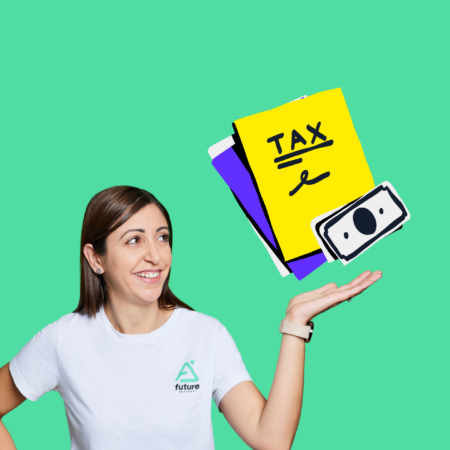Everything You Need To Know About Crypto Tax
Whilst it may be a word you’re sick of hearing, many of you jumped on the flaming hot bandwagon when crypto rose to be the newest trend in investing. Some of you may have even dabbled briefly and forgot about it. Or, maybe it’s become somewhat of a lucrative hobby. Either way, you need to understand the tax implications of trading cryptocurrency.
If you’ve purchased or sold cryptocurrency in the last financial year, it’s likely that your investments may have an impact on your tax obligations and tax return. This is especially true if you’ve made a profit from selling or trading cryptocurrency — you’ll need to declare this on your tax return.
The ATO recently announced that it will specifically target cryptocurrency traders, so it’s more important than ever that you understand your tax obligations.
The complicating factor here is that crypto tax is still new and therefore constantly evolving. You can stay up to date on the latest by checking the ATO’s guide to cryptocurrency tax.
Will the ATO know about your Crypto?
Put simply, YES! If you have an account with an Australian Cryptocurrency designated service provider (DSP), then it’s likely that the ATO already has your data.
The ATO has a data sharing program with all Australian Exchanges and your crypto transaction data from as far back as 2014. They also have the Know Your Customer information you provided when signing up for any Australian exchange or wallet.
How is Cryptocurrency Taxed?
Any profit made from cryptocurrency is taxed like any other profit made from the sale of investments held, such as shares listed on the ASX, under the Capital Gains Tax regime.
For example
An individual purchases one Bitcoin for $30,000 and then either swaps it for another coin, spends it in return for goods and services, or cashes out of the coin when the value of Bitcoin rises to $70,000. The individual would have made a $40,000 capital gain.The capital gain would be declared in their personal tax return at the end of the year and tax would be calculated at their marginal tax rate on their taxable income for the year. If the individual held the Bitcoin for over 12 months, they would be eligible to use the 50% discount available and hence only $20,000 would be included in their taxable income.
As you can see, the ATO taxes cryptocurrency based on profits or losses generated on disposal of the cryptocurrency asset. Below we outline the way this can differ, according to specific circumstances. Stick with us, it’s a long one!

How Does the ATO Classify Cryptocurrency?
For the full guide, have a read about the tax treatment of cryptocurrencies on the ATO website. In simple terms, they don’t consider crypto as money or foreign currency. Instead, it’s classified as property (confusing, we know). As a result, crypto is treated the same as any other asset for capital gains tax purposes. If you sell, gift, exchange or spend your crypto, CGT will apply.
If you hold your crypto for over 12 months, you may be entitled to a 50% capital gains discount, depending on the type of entity the crypto is held in, i.e. the discount does not apply if the crypto is held through a company structure.
Remember how we said you won’t be taxed until disposal? That makes a lot of sense in this context too, as you won’t make that capital loss or gain until you sell, gift, exchange or spend it. If you’re still holding the crypto and the value increases or decreases, it’s irrelevant. No tax implications come into play until that disposal happens, unless you are a crypto trader, which we will discuss next!
Am I a Crypto Investor or Trader?
Head to the ATO website for a full rundown of investing versus trading. The key question to ask yourself is this: am I investing in crypto with the intent of holding it long term, with the sole purpose of realising a profit from disposing of it, or am I buying and selling large volumes of crypto in a business like manner and with significant repetition, with the intent of earning an income?
Crypto Taxed as Income
When your intent is to earn an income through the regular buying and selling of crypto in a business like manner, this will be treated as business income, meaning it’s held on a revenue account and the entire profit is treated as taxable income in your tax return. If you are a trader then all your cryptocurrency will need to be converted to Trading Stock. Don’t worry, we can definitely help you with that.
Crypto as Investment
If you’ve purchased crypto with the intention of holding it long-term, or if you’re a casual dabbler, then you’re subject to CGT in the same way you would be for other investments, such as shares or property. This one’s pretty straight forward (although there are exceptions to this rule because the ATO likes to keep us on our toes).
Tax Treatment of Crypto to Crypto Trades
One strategy for crypto investing involves trading between crypto currencies according to how the market is moving. Even though this activity doesn’t actually involve AUD, they are still subject to CGT. As we mentioned above, crypto is considered property for tax purposes and so trading crypto for crypto is effectively trading property for property, hence CGT still being applicable.
Lesson: keep track of all trades and swaps in their AUD value.
Mining, Farming, Chain Splits, Forks and Airdrops… huh?
Mining or farming is the process by which new bitcoins are entered into circulation, but it is also a critical component of the maintenance and development of the blockchain ledger. It’s performed using very sophisticated computers that solve extremely complex computational math problems.
Chain splits and forks are the same thing: when a single origin coin is split into more than one independent coins. See here for a better description.
Airdrops are essentially a marketing ploy for crypto nerds 😉 A small amount of a new coinwill be dropped into your wallet to raise awareness of its launch. Read more about crypto airdrops here.
The tax treatment of coins mined/farmed, chain splits, forks and airdrops depends on whether the crypto is held as a business or as an investment.
Crypto Traders
If you do this as a profession – trading multiple times daily or weekly – then crypto is treated as ordinary income, just as profits from any other business would be. You can claim deductions on your business operations and should refer to usfor a more in depth explanation.
Crypto Specialising Businesses
This is treated similarly to the above: if you’re holding the crypto for exchange or sale as part of your ordinary business operations (digital currency exchange or mining operations for example) then trading stock rules apply. Any income made off the trade is treated the same as ordinary income, meaning you can also claim the cost of acquiring the crypto as a business expense.
What If My Business Accepts Crypto as a Form of Payment?
You must keep records in line with ATO guidelines, including the AUD value of the received crypto as part of your ordinary income. If you then use the crypto to purchase business related items or services, you may be eligible to claim a deduction for these expenses.
When is Cryptocurrency Not Subject to Tax?
CGT is not applied to crypto if:
- It’s used to purchase personal use goods and services
- The capital gains generated from personal use assets are less than $10,000
Sometimes, the purpose of your crypto may change. For example, if you purchase it as a personal use asset (as above) but the crypto has a big value increase, you may then choose to hold onto it as an investment. The ATO will assess how long you’ve held it for as this is a key indicator of whether you intend to use it for investment purposes. Then, the tax implications are as outlined above in the Crypto As Investment section.
Crypto Record Keeping
This is a really important part of the crypto tax puzzle! The details of your record keeping should include:
- The date and purpose of each crypto transaction
- The value of the transaction at the time it was made
- The details of any other party involved in the transaction, including the wallet address
- Records from exchanges used to obtain or trade crypto
- Digital wallet record and keys
- Transaction list of all crypto purchases or transfers
If you lasted this long… you’re serious about your crypto. Or, you’re very bored in lockdown. We feel you. Crypto tax is not easy and it’s not clear, so be sure to get in touch and get your tax sorted properly, from one of our team members who knows their stuff inside and out.













